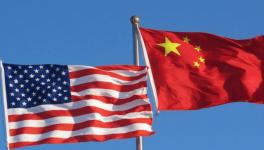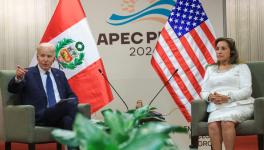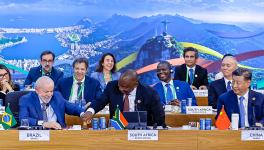West is Paranoid About BRICS Summit

Reuters carried a speculative report last week that Indian Prime Minister Narendra Modi might not attend the BRICS summit in Johannesburg in person and, furthermore, that India disfavoured an expansion of the grouping. Reuters’ long history of Cold War skulduggery notwithstanding, the gullible Indian media fell for the rumour mongering.
And it created some confusion, but only momentarily. South Africa is conscious that with the state of play in its bilateral ties with the US being what it is, President Cyril Rampaphosa’s excellent personal equations with Russian President Vladimir Putin, BRICS’ sojourn on the ‘’de-dollarisation’’ pathway and its expansion plans, there are high expectations of Modi government’s constructive role to make the upcoming event in Johannesburg a historic milestone in 21st century world politics.
The plainspeak by the South African foreign minister Naledi Pandor on the Reuters report is spot on. Pandor said, “I did speak to various colleagues in government and outside, and everybody was astounded by this rumour. I think that someone who is trying to spoil our summit is creating all sorts of stories that suggest that it won’t be successful.
“The prime minister of India has never said that he is not attending the summit. I am in constant contact with foreign minister Jaishankar. He has never said that. Our sherpas are in touch and they have never said it. So, we have all been trying to look for this needle in a haystack that began this rumour.”
There was a time not too long ago when the West used to ridicule the BRICS as an ineffectual butterfly beating its wings in the void in a world order dominated by the G7. But the ‘‘butterfly effect’’ is being felt today in the remaking of the world order.
Simply put, the torrential flow of events in the past year in the situation around Ukraine brought to the surface Russia’s existential struggle vis-a-vis the US, which in turn triggered a tectonic shift in the international landscape, one transformative aspect being the rise of the Global South and its increasingly important role in international politics.
The Biden administration wouldn’t have expected that a polarisation to isolate Russia and China would end up like this. Paradoxically, Washington’s ‘‘dual containment’’ of Russia and China, as enshrined in the Biden Administration’s National Security Strategy marked the beginning of the Global South breaking away from the control of the big powers, repositioning their international status and role, and seeking strategic self-confidence and autonomy.
Saudi Arabia is a stellar example — assuming an independent trajectory in regional hot spots such as Sudan or Syria, calibrating the world oil market through the OPEC Plus format rather than obeying the diktats from Washington, and in seeking BRICS membership.
The developing countries are gaining room to manoeuvre in the game of big powers and their political influence has risen rapidly. Their diplomatic independence and strategic autonomy against the backdrop of the Ukraine crisis has accelerated their rise as an emerging force in global politics in a remarkably short period of time.
What prompts the 23 non-Western countries to formally seek BRICS membership — although, the grouping doesn’t even have a secretariat — is because the grouping is perceived today as the principal platform of the Global South espousing an equitable world order and, therefore, has a tryst with the destiny of mankind.
Right from its inception, BRICS has been savvy enough not to inject any ‘‘anti-Westernism’’ into its agenda — in fact, none of its founding members has a ‘‘bloc mentality’’. But that hasn’t prevented the West from feeling threatened. In reality, this threat perception emanates out of a morbid fear of extinction that the 4-century old Western dominance of the political and economic order and the international system is drawing to a close.
Neo-mercantilism, which is crucial to arrest the decline of the western economies, is being frontally challenged, as we are witnessing in real time in Niger. Without the massive transfer of resources from Africa, the West faces a dim future. The European Union’s foreign policy chief Josep Borrell blurted out in a weak moment that the West, a manicured garden, is threatened by the jungle. The atavistic fears and instincts implicit in Borrell’s metaphor are simply stunning.
Hence such frenzy to run down BRICS, to weaken its resolve, to tarnish its image and standing, and prevent it from gathering momentum. Alas, the same old colonial ‘‘divide and rule’’ mindset is at work to amplify the differences and disagreements between the BRICS member states.
The controversy about the Indian stance on BRICS expansion can be seen only that way. Last week, following the rumour mongering by Reuters, Indian foreign ministry spokesman felt compelled to clarify all over again, ‘‘Let me repeat again. We have clarified our position in the past. As mandated by the leaders last year, BRICS members are internally discussing the guiding principles, the standards, criteria, and procedures for the BRICS expansion process on the basis of full consultation and consensus. As our External Affairs Minister had mentioned, we are approaching this with an open mind and a positive outlook. We have seen some baseless speculation… that India has reservations against expansion. This is simply not true. So let me put it very clearly from that.’’
As regards the canard that Modi planned to skip the trip to Johannesburg, the Indian spokesman reacted, ‘‘I would urge you not to go by speculative media reports. When we are in a position to talk about, to announce such high-level visits, we will certainly do so, and you’ll know that that’s been our practice. For the moment, I would urge you all to just be patient and let us announce it at the right time.’’
Equally, the Anglo-American conspiracy behind the ICC’s arrest warrant on Putin is self-evident. Russia had pioneered BRIC and the grouping’s first summit took place in Yekaterinburg in 2008 [which, by the way, issued a joint statement warning against the global domination of the US dollar as the world’s standard reserve currency.]
Putin has been tirelessly campaigning for ‘‘de-dollarisation’’ and is the most resonant voice today on that issue on the international stage. Putin’s prognosis has gained wide acceptance in the Global South, as evident from the exodus of countries opting for national currencies to settle their mutual payments.
Washington is increasingly concerned that a process of ‘de-dollarisation’ is gaining traction in the international financial system following its excessive weaponisation of sanctions and arbitrary seizure of dollar reserves of countries it does not get along with.
Interestingly, Bloomberg featured an article on the BRICS summit titled ‘‘This club isn’t big enough for both China and India.’’ Its thesis is that ‘‘tensions between the Asian rivals will likely prevent the BRICS bloc from ever posing a coherent challenge to the West.’’ It is a hackneyed attempt to dwell on the contradictions that exist between China and India to drive a wedge and undermine BRICS unity.
True, India may have concerns about China dominating the BRICS group. But then, China is also a strong exponent of BRICS expansion and increased representation of developing countries. Doesn’t that show a strategic convergence?
Fundamentally, despite their unresolved border dispute, India and China have a common vision that BRICS plays an essential role on the global multilateral stage. Both countries also see the BRICS as a platform to enhance their international status and influence. This commonality of interests is what worries the West.
For India, BRICS is a favourable instrumental platform to realise its aspiration to achieve greater representation on the international stage. Therefore, BRICS success can only strengthen India’s foreign policy — and, conceivably, may even create some positive energy and ambience in its relations with China.
MK Bhadrakumar is a former diplomat. He was India’s ambassador to Uzbekistan and Turkey. The views are personal.
Get the latest reports & analysis with people's perspective on Protests, movements & deep analytical videos, discussions of the current affairs in your Telegram app. Subscribe to NewsClick's Telegram channel & get Real-Time updates on stories, as they get published on our website.






















